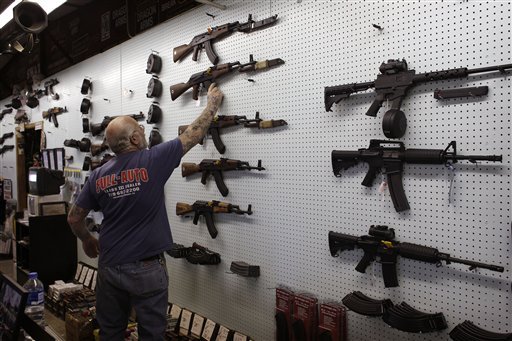Federal law requires an instant background check for the buyer in every gun sale. That is, it’s required unless the buyer doesn’t want one.
It is mandatory in a licensed gun dealer’s shop, but Internet sales and private sales at gun shows or in homes, motel rooms and parking lots are not covered. An estimated 40 percent of gun sales are made without background checks, a proportion so large the word “loophole” doesn’t describe it.
This is not a flaw in the system — it’s a system designed not to work.
Attempts to fix this problem on the federal level have foundered, dissolving into the same partisan gridlock that has dominated Washington for the last three years. Now it’s up to Maine legislators to take on this problem.
The politics are not easy, but a bipartisan group of members of the Legislature’s Criminal Justice Committee is working on a consensus bill that would protect gun owners’ rights while doing a better job of keeping weapons out of the wrong hands.
The framework of the negotiations is a bill sponsored by Rep. Mark Dion, D-Portland, who is a former police officer and Cumberland County sheriff.
Dion’s bill deals with a number of weaknesses in the system, including modernizing the definitions of the kinds of mental illnesses that disqualify someone from buying a gun. Most important, his proposal would require background checks in nearly all private sales. Another bill, which came out of committee on a partisan vote, would require background checks for gun shows only and leave this loophole open for other private sales.
This has been cast as a gun-rights issue, but it is not. Anyone who has a right to own a gun would still have that right and would not be prevented from buying more. The only people who would be stopped from acquiring a gun would be those who fail a background check, either because they are a felon or they have a serious mental health history.
Connecticut, New York and Massachusetts have already changed laws to require more background checks, putting Maine in a vulnerable position. If criminals know that they can get around tougher requirements at home when they take a trip to Vacationland, we may be attracting a kind of visitor we don’t want.
The argument most often heard against tightening the background check law is that it is an emotional response to the Newtown massacre, but would not have prevented that heinous act. The critics are most likely right. Universal background checks probably wouldn’t have made a difference in that case.
But that does not make improving the law the wrong response to Newtown, which showed in horrid detail what can happen when guns fall into the hands of people who shouldn’t have them. If we had responded to the 9/11 attacks by only implementing those proposals that would have prevented planes from crashing into the World Trade Center and the Pentagon, then screening for small knives and hardening cockpit doors would have been enough.
We did more because once we saw how vulnerable we were to attack, we had a responsibility to protect each other in every way we could see.
That’s why Newtown should be a call to action for Maine lawmakers, especially since their counterparts in Washington are too tied up in politics to act.
We urge Maine lawmakers to work to find common ground on this issue and take this moderate step toward preventing gun violence.
Send questions/comments to the editors.



Success. Please wait for the page to reload. If the page does not reload within 5 seconds, please refresh the page.
Enter your email and password to access comments.
Hi, to comment on stories you must . This profile is in addition to your subscription and website login.
Already have a commenting profile? .
Invalid username/password.
Please check your email to confirm and complete your registration.
Only subscribers are eligible to post comments. Please subscribe or login first for digital access. Here’s why.
Use the form below to reset your password. When you've submitted your account email, we will send an email with a reset code.